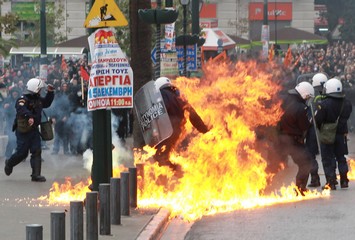ATHENS (Reuters) – A group of 150 hooded demonstrators attacked three policemen in an Athens hospital after a protester was seriously injured in an anti-austerity march on the first day of a visit by EU and IMF inspectors.
Police had fired several rounds of teargas earlier on Wednesday to disperse stone-throwing protesters as senior EU and IMF envoys began talks with the government on stepping up fiscal reforms needed to get the next slice of a bailout package.
“The hooded youths broke into the hospital manager’s office and beat up three policemen who were there investigating the protester’s injuries,” said a policeman who declined to be named. “Two policemen were slightly injured and one suffered more serious injuries to the head.”
The 31-year-old Greek protester, named Ioannis Kafkas, was in a stable but critical condition after undergoing brain surgery, the Health Ministry said earlier on Wednesday.
Senior European Union and International Monetary Fund inspectors met Finance Minister George Papaconstantinou at the start of the visit just meters (yards) away from the protest march organized against wage cuts and tax hikes which unions say are strangling the economy.
Police said 17 demonstrators and two policemen were hurt in the clashes while 24 people were detained as a one-day nationwide strike brought much of Greece to a halt.
The EU/IMF visit will decide whether Greece will get a fifth tranche of aid from the 110 billion euro bailout that saved it from bankruptcy last year. Without the next 12 billion euro tranche, the key to paying 13.7 billion euros of immediate funding needs, Greece would effectively default.
The IMF and EU officials will also consider giving Athens improved loan terms or more aid to avoid restructuring its huge debt. Investors say a restructuring, imposing losses on private bondholders, is inevitable without more funds.
Euro zone officials including German Chancellor Angela Merkel say they will wait for the result of the inspection visit before taking any decisions.
Police said about 20,000 protesters — fewer than previous protests — marched to parliament. Greece has a history of protests that can turn violent. In December 2008, Athens was paralyzed for weeks by riots triggered by the police killing of a teenager and fueled by anger at economic hardships.
“ENOUGH!”
Athens was nearly deserted with many shops and public services closed and posters reading: “We can’t take it any more. The rich and the tax evaders should pay.”
Litsa Papadaki, 60, a housewife and mother of three who was protesting in central Athens, said: “Enough is enough! They are killing us and our children.”
Greek debt prices have stabilized, but markets are braced for some form of restructuring in the long run because Greece is laboring with a 327 billion euro debt mountain.
Ten-year Greek bonds were changing hands at around 55 percent of their face value, carrying a secondary market yield of 15.696 percent — little changed on the day, but up more than 3 percent since the start of the year.
The Socialist government has cut salaries and pensions and increased taxes, despite repeated strikes, to meet bailout targets. But such measures have plunged the country into a deep recession and crimped tax revenues, hampering efforts to tackle a debt of nearly 150 percent of GDP.
The nationwide strike grounded flights and halted shipping. Hospitals were operating on skeleton staff, schools were closed and city transport was disrupted.
Greek newspapers reported on Wednesday that the government was nearing agreement for supplementary EU/IMF loans of 50-60 billion euros to cover its funding gap in 2012 and 2013 in exchange for bold privatizations.
But a euro zone source in Brussels said Greece needed to show progress toward meeting fiscal and privatization targets before further emergency funding could be considered.
Ministers are now conceding that Greece cannot regain investor trust to go back to the markets for finance in 2012 and analysts say the government faces difficult choices.
“More austerity is probably not good for the economy … it will deepen the recession and we don’t know whether it is going to produce results in terms of fiscal consolidation,” said Diego Iscaro, at IHS Global Insight. “On the other hand, people will start losing faith in the government strategy.”
The private sector union GSEE and its public sector sister ADEDY, which together represent about half the work force, say austerity is killing the economy, which shrank by 4.5 percent in 2010 and is expected to contract by another 3 percent this year.
Unemployment jumped to a record 15.1 percent in January.
GSEE said there was a 100 percent turnout for the walkout but government officials said only 12 percent of workers at public services participated.
Prime Minister George Papandreou chaired a cabinet meeting on Wednesday, the second in as many days as he tries to rally support for new fiscal and privatization plans and quell mounting discontent in party ranks.
“We have a duty to lead the country out of the crisis in the best possible way,” he told his ministers after some complained about a slowing pace of reforms.
The EU and IMF mission chiefs will be in town for about a week, after experts started the audit in early May. Officials said they would focus on a 2011-2015 fiscal plan and on progress in raising 50 billion euros from privatizations by 2015.









